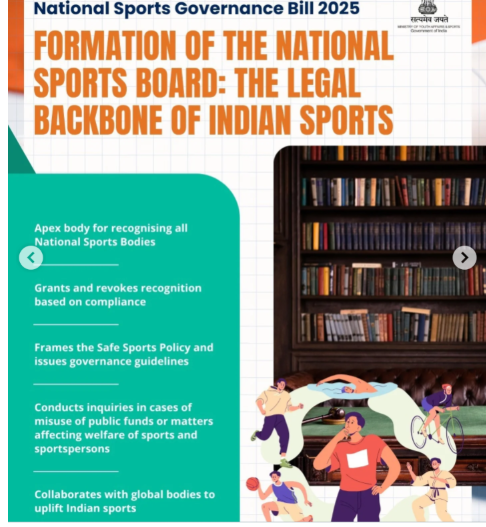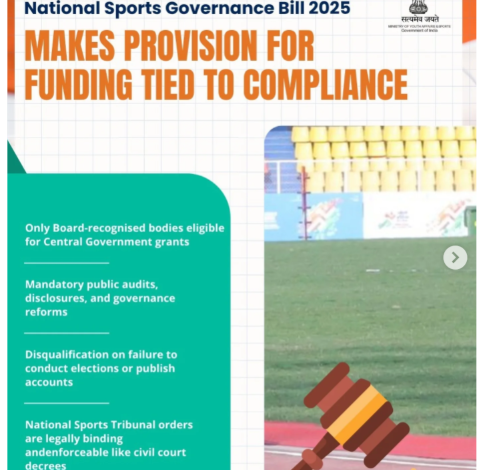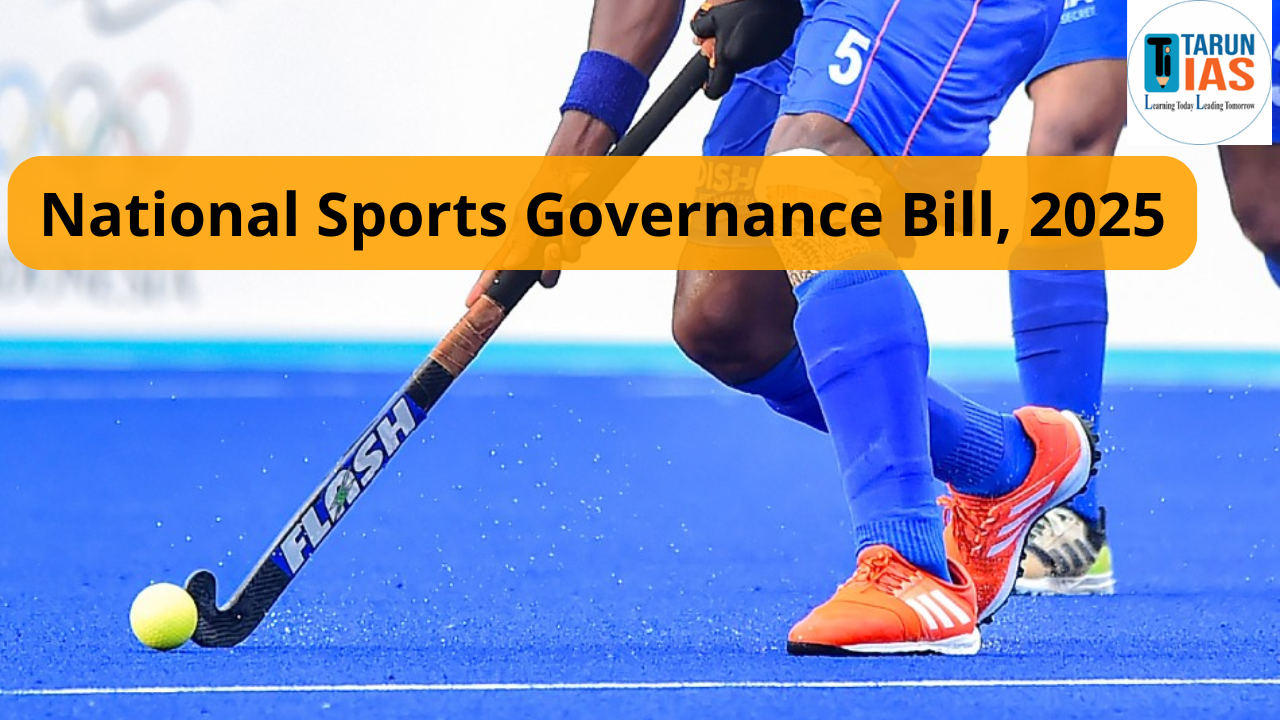National Sports Governance Bill, 2025 Introduction
- India’s sporting landscape has long been marred by inefficiencies, lack of accountability, and a need for robust governance structures.
- The introduction of the National Sports Governance Bill, 2025 in the Lok Sabha marks a significant step towards reforming India’s sports administration and setting new standards for athlete welfare, ethical practices, and institutional integrity.
- This landmark Bill aims to bring much-needed changes that could unlock India’s full athletic potential, which has been stifled for decades by outdated governance structures.

National Sports Governance Bill, 2025
-
- The National Sports Governance Bill, 2025 was recently introduced in the Lok Sabha.
- This Bill is aimed at implementing comprehensive reforms in sports administration and governance in India.
- Objective of the Bill: The primary goal of the Bill is to bring about reforms that focus on ethical practices, athlete welfare, and the establishment of institutional standards in sports governance.
Key Objectives of the Bill
- Promote Good Governance: The Bill aims to establish ethical practices and universal principles of good governance, fair play, and transparency within national sports bodies. It aligns these practices with the Olympic and Paralympic Charters and international best practices.
- Formalize Sports Administration: One of the key objectives is to provide a legal foundation for sports governance, replacing the non-statutory Sports Code of 2011, which lacked enforceability. This will ensure that sports administration is governed by enforceable laws.
- Promotion of Sports and Welfare of Athletes: The Bill focuses on creating frameworks that promote sports and ensure the welfare of athletes. It also aims to uphold ethical practices in governance, ensuring that athletes’ interests are safeguarded.
- Institutional Capacity and Standards: It seeks to develop the institutional capacity of sports federations, ensuring that their governance is in line with global standards, Olympic principles, and ethical conduct.
- Sports Dispute Resolution: The Bill facilitates the establishment of a unified and equitable system for resolving sports-related grievances and disputes, ensuring a fair and efficient resolution process.
- Prepare for Global Events: By demonstrating a commitment to clean and professional sports governance, the Bill aims to position India as a global leader in sports and strengthen its bid to host major international events, including the 2036 Olympics.

Important Provisions of the National Sports Governance Bill
- Establishment of National Sports Governing Bodies:
- National Olympic Committee (NOC): The NOC will be designated as the sole governing body for Olympic sports in India.
- National Paralympic Committee (NPC): The NPC will be the exclusive authority for governing Paralympic sports in the country.
- Other Federations: The Bill officially recognizes National Sports Federations (NSFs) and Regional Sports Federations (RSFs) to streamline governance at both the national and regional levels.
- Creation of the National Sports Board (NSB):
- The NSB will act as a statutory regulatory body, similar to SEBI, overseeing the operations of all sports federations, including the BCCI.
- The NSB will be empowered to grant recognition to sports bodies and ensure uniform governance standards across the sports sector.
- It will be responsible for registering all affiliated units of NSFs, improving transparency and coordination within the sports ecosystem.
- The board will be supported by budgetary provisions and have the capacity to hire domain experts in law, auditing, and governance.
- Setting up of the National Sports Tribunal (NST):
- The NST will serve as an independent dispute resolution body with powers equivalent to a civil court.
- It will be chaired by a sitting or retired Supreme Court judge or a Chief Justice of a High Court, along with two members who have expertise in sports, administration, and law.
- The NST will handle disputes related to athlete selection, federation elections, governance issues, etc.
- Appeals from the Tribunal can only be made to the Supreme Court, with civil courts having no jurisdiction over these matters.
- All expenses of the Tribunal will be covered by the Consolidated Fund of India.

- National Sports Election Panel:
- A dedicated panel will be established to ensure free and fair elections for the Executive and Athletes’ Committees of all recognized national sports bodies.
- Code of Ethics and Transparency:
- Every national sports body will be required to adopt a Code of Ethics that aligns with international norms.
- There will be a strong emphasis on governance through transparency, ensuring that federations make essential data publicly accessible.
- The RTI Compliance: All recognized sports organizations will be covered under the Right to Information Act, 2005, enhancing public accountability.
- Safe Sport Policy and Grievance Redressal:
- All sports bodies will be required to implement a Safe Sports Policy to safeguard vulnerable groups, especially women and minor athletes.
- The grievance redressal mechanisms must be athlete-friendly, transparent, and time-bound.
- Age and Tenure Norms for Administrators:
- The upper age limit for administrators will be raised to 75 years.
- The Bill will remove fixed tenure restrictions, allowing Indian administrators to secure leadership roles in international sports bodies.
- Bringing the BCCI Under the Regulatory Framework:
- Historically, the BCCI has operated outside the government’s oversight. However, the Bill proposes bringing the BCCI under the regulatory purview of the National Sports Board.
- Once the Bill is enacted, the BCCI will need official recognition from the new National Sports Board. Any disputes involving the BCCI will be handled by the National Sports Tribunal.

Significance of the Bill
- Enhanced Transparency and Accountability:
- RTI Compliance: Bringing all recognized sports bodies, including the BCCI, under the Right to Information (RTI) Act is a significant step. This will increase public scrutiny and force sports federations to be more transparent in their decision-making, functioning, and financial management.
- CAG Audits: The Bill mandates periodic audits by the Comptroller and Auditor-General of India (CAG) for the National Sports Board Fund. This ensures greater fiscal discipline and accountability in the use of public funds.
- Resource Allocation: By holding federations accountable for their financial decisions, the Bill ensures that resources are used effectively, particularly benefiting emerging athletes, coaches, and training facilities.
- Whistleblower Protection: The Bill introduces whistleblower protection, allowing athletes and officials to report corruption without the fear of retaliation.
- Athlete-Centric Approach and Welfare:
- Representation of Athletes: The Bill mandates the inclusion of a minimum number of outstanding sportspersons in the Executive Committees and General Bodies of sports federations. This ensures that athletes, who are the core stakeholders, have a direct voice in governance and policy-making.
- Safe Sports Policy: The introduction of a Safe Sports Policy with safeguards against harassment and abuse, particularly for women and minors, is a crucial step in creating a secure and supportive environment for athletes. This policy aligns with global best practices for athlete protection.
- National Sports Tribunal (NST): The establishment of a dedicated National Sports Tribunal (NST), headed by a high-ranking judicial officer, will help reduce the burden on the general judiciary. It will ensure that sports-related disputes are resolved by experts in sports administration, leading to more informed and consistent judgments.
- Improved Governance and Professionalism of National Sports Governing Bodies:
- Statutory Backing: The shift from the non-statutory Sports Code to a fully-fledged Bill provides a stronger legal foundation for sports governance, making the guidelines enforceable.
- Electoral Panel: The creation of a National Sports Election Panel aims to ensure free, fair, and democratic elections within sports federations, reducing disputes over election irregularities.
- Gender Diversity: The Bill mandates a minimum number of women in executive committees, promoting gender equality and inclusivity in sports administration.
- Compliance with International Charters: The Bill aligns Indian sports governance with the core principles of the Olympic Charter, Paralympic Charter, and international best practices. This will improve India’s credibility on the international stage and create opportunities for greater collaboration, funding, and hosting international events.
- Code of Ethics: The requirement for national sports bodies to adopt and adhere to a Code of Ethics will promote ethical conduct, reducing issues related to corruption, doping, and conflicts of interest.
Criticisms of the Bill
- Concerns Over Autonomy and Government Interference:
- A major criticism of the Bill is that it could potentially violate the autonomy of National Sports Federations (NSFs) and the Indian Olympic Association (IOA).
- International bodies such as the International Olympic Committee (IOC) and the International Paralympic Committee (IPC) uphold the principle of autonomy for national sports organizations. Excessive government control or interference could lead to the suspension or de-recognition of Indian sports bodies by these international organizations, which might result in Indian athletes being barred from participating in international events.
- For example, the proposed National Sports Board has been granted overriding powers to grant or suspend recognition of sports bodies, potentially leading to direct government control over the daily functioning of autonomous sports organizations.
- Relaxation of Age Limits:
- While the previous Sports Code (2011) imposed stricter age and tenure limits, the Bill allows for an upper age limit of 70 years for office bearers, with the possibility of extending it to 75 years if permitted by international charters.
- Critics argue that this relaxation may result in the entrenchment of older administrators, thereby hindering the induction of fresh talent and new ideas. This could lead to institutional capture by long-serving officials, limiting the upward mobility of younger, former sportspersons into leadership roles.
- National Sports Tribunal (NST) Jurisdiction and Appeals:
- The exclusion of disputes related to games organized by international bodies and anti-doping cases from the jurisdiction of the NST means that a significant number of sports-related disputes may still fall outside the purview of the Tribunal.
- Additionally, mandating the Supreme Court as the primary appellate body for NST decisions may add to the already heavy workload of the apex court, potentially undermining the goal of providing faster dispute resolution.
- Lack of Clarity on State Associations:
- The Bill lacks clear provisions regarding the role and regulation of State Olympic Associations and State Sports Federations. This lack of clarity could undermine efforts toward decentralization and create a regulatory vacuum at the state level, potentially weakening the overall governance structure.















